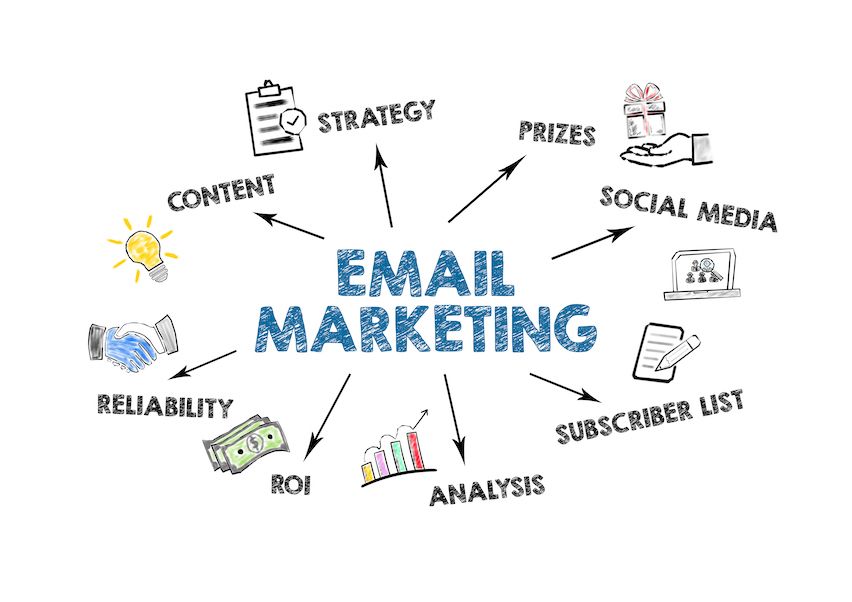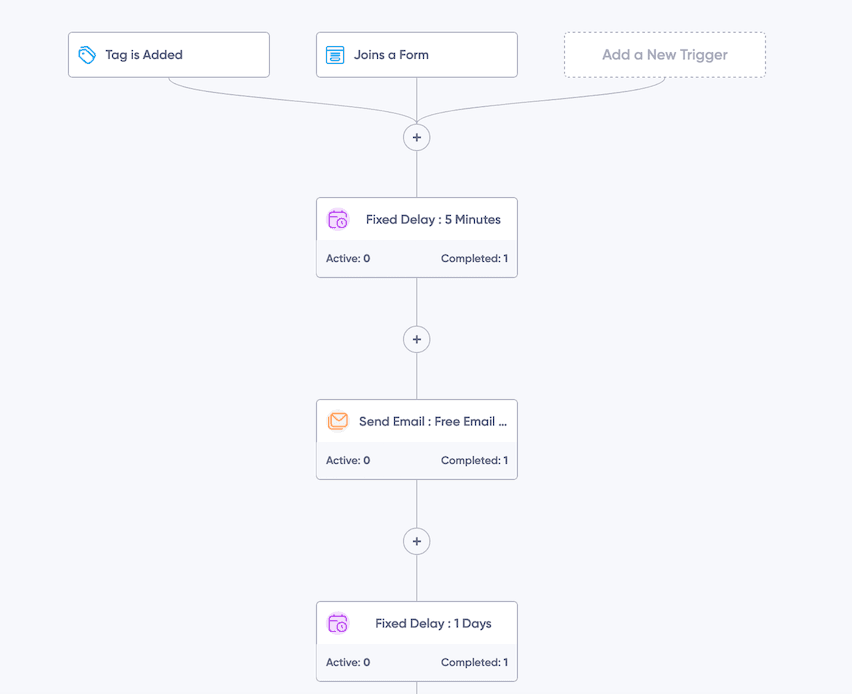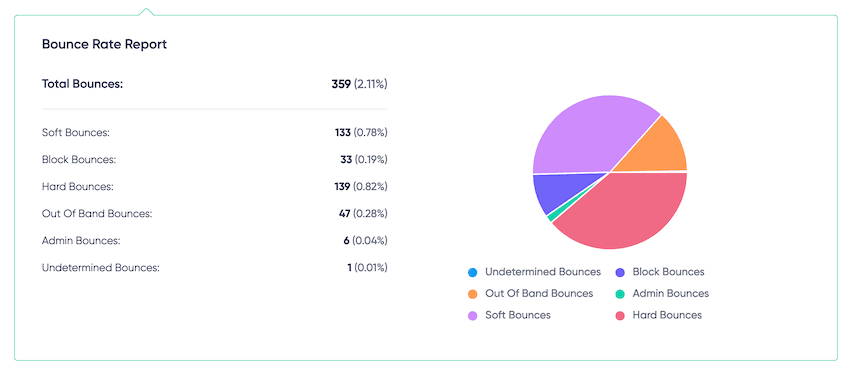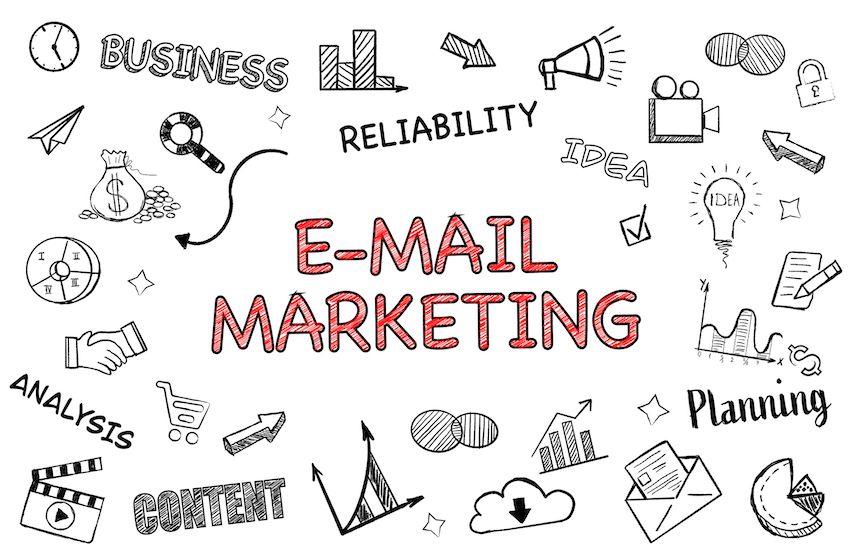Contents
the email tool that makes email marketing simple
Top 25 Advantages of Email Marketing for Small Businesses
Published: March 27, 2025
Email marketing delivers an average return of $42 for every $1 spent. This high efficiency underscores its importance in a well-rounded marketing strategy. Beneficial for all business sizes, email marketing enables direct engagement with customers, bringing many benefits.
Before we get into the top 25 advantages of email marketing, let's first understand what email marketing is and why it should be part of your small business digital marketing strategy.
What Is Email Marketing?
Email marketing is a form of promotion that specializes in sending emails to promote a business. It's about directly engaging with customers and potential customers through their inboxes. This approach differs from mass, generic advertising, as it focuses on delivering personalized and relevant content to individuals who have shown interest in your business.
As content marketing has evolved, email marketing has become highly personalized. Businesses can now craft messages based on individual customer preferences, previous interactions, and behaviors, thanks to the capabilities of modern email marketing software. This targeted approach ensures that each customer receives relevant content tailored to their specific interests and needs.
Advantages of Email Marketing
Now that we know what email marketing is, let's look at the specific benefits it offers. Each email marketing benefit we look at in this section highlights its importance as a key element of a successful marketing plan.
1. High ROI and cost-effectiveness
Email marketing is celebrated for its high return on investment (ROI) and cost-effectiveness, qualities that make it a valuable strategy for businesses, especially when compared to traditional marketing channels. Its high ROI results from a targeted approach to customer engagement, ensuring that marketing activities are efficient and lead to significant returns like enhanced reach and better utilization of marketing funds.
Email marketing's cost-effectiveness lies in its low financial barrier compared to traditional channels that often incur higher costs for materials and distribution. Most email marketing expenses are confined to software and email providers for campaign management. This cost efficiency is particularly beneficial for smaller companies as it allows them to expand their reach without overstretching their budget. For example, a small business can launch a successful campaign at a fraction of the cost of a print ad campaign, achieving similar, if not better, engagement rates.
2. Improved sales
Email marketing is also a powerful tool for driving sales, particularly for startups and small businesses. By delivering targeted and relevant content directly to email subscribers who have shown interest in your brand, you're able to influence purchasing decisions effectively. Tailoring offers and showcasing services through email campaigns can directly impact sales conversions.
Email marketing excels in its ability to be personalized. By creating messages that are tailored to the customer's behavior, preferences, and previous interactions, each email becomes more effective and persuasive. Straightforward calls to action in these emails can quickly lead to higher sales. This makes emails an invaluable asset for increasing sales performance.
Additionally, email marketing supports various stages of the customer journey, from introducing new products to offering discounts and reminding customers about abandoned shopping carts. It's a versatile tool that not only nurtures leads but also actively converts them into sales, playing a vital role in the revenue generation for your business.
3. Finds quality leads
Email marketing excels in identifying and nurturing quality leads, something crucial for business growth. Precision targeting allows campaigns to reach individuals likely interested in your offerings, segmenting your audience based on criteria like past purchases, website activity, or demographics. This focused approach ensures your messages are directed to a receptive audience, enhancing the efficiency of your marketing campaigns.
Targeting quality leads increases the probability of attracting customers genuinely interested in your products or services. This not only improves the potential for sales but also ensures marketing resources are utilized effectively, reaching those most likely to engage and convert. Email marketing, with its ability to hone in on these quality leads, becomes a valuable tool in your overall strategy to grow and sustain your customer base.
4. Strengthens customer relationships
Email marketing can help significantly in establishing and maintaining strong customer relationships. By regularly engaging with your audience through personalized emails, you demonstrate a commitment to meeting their needs, thereby building trust and loyalty. This approach includes:
- Informing customers: Keeping them updated about new products, offers, and news
- Soliciting feedback: Showing that you value their opinions and experiences
- Building trust: Establishing consistent, reliable communication
Such engagement strengthens relationships but also naturally enhances brand loyalty, leading customers to become advocates for your brand. A natural outworking of this is improved sales and loyal customers.
5. Drives website traffic
Email marketing is a potent tool for increasing website traffic. By including direct links in emails, businesses can guide subscribers to their websites for various purposes, such as reading a blog post, exploring new products, or taking advantage of special offers. This direct connection simplifies the path for the audience to engage more deeply with the brand's online presence.
Additionally, the strategic placement of these links in relevant and interesting email content can significantly enhance the likelihood of recipients clicking through to the website. This approach drives immediate traffic and reinforces the habit of visiting
6. Promotes new products and services
Email marketing is highly effective for introducing new products and services, and reaching an audience already engaged with your business. It offers a direct channel to detail the features and benefits of new offerings, personalizing the message to fit the customer’s interests and lifestyle. For instance, a launch email can vividly describe how a new product solves specific problems or enhances the customer's experience, making the promotion both personal and compelling.
Targeted campaigns are particularly useful for this purpose. By segmenting your audience, such as targeting customers who have shown interest in similar products in the past, you increase the likelihood of engagement and conversion. This focused approach ensures that your promotional efforts are efficient and highly relevant to the recipients and will drive product awareness and sales.
7. Allows personalized content creation
Email marketing excels in its use of personalized content, which significantly enhances customer engagement. Unlike broad, generic advertising strategies, email allows for customization that speaks directly to each recipient's individual preferences and interests. This personalization can range from addressing the customer by name to recommending products based on past purchases or browsing behavior.
The power of personalization lies in its relevance to the recipient. When customers receive content that is tailored specifically to them, it effectively captures their attention and fosters a deeper connection with the brand. They feel recognized and valued. This leads to increased engagement with the content, be it through higher email open rates, click-throughs, or direct responses.
Moreover, this personalized approach leads to immediate and measurable results. Each email's effectiveness can be tracked, providing valuable insights into customer preferences and behaviors. This data can then be used to refine future email marketing campaigns, creating a cycle of continuous improvement, progressively effective communication, and improved sales. By delivering content that resonates on a personal level, email marketing captivates the audience and drives meaningful interactions that contribute to business growth.
8. Segments and targets
Email marketing is particularly useful for segmentation and targeting, allowing businesses to divide their audience into specific groups based on various criteria like demographics, purchase history, and engagement levels. This partitioning will help you to craft more relevant and impactful communication. Instead of a one-size-fits-all approach, emails can be tailored to meet the unique needs, interests, and behaviors of different segments, significantly enhancing the effectiveness of your marketing campaigns.
Segmentation ensures that the content is highly relevant to each recipient, increasing the likelihood of engagement and conversion. For example, a business can send different content to new customers versus repeat customers, or create tailored messages for different age groups or geographic locations. This personalization makes each email more resonant and valuable to the recipients, leading to higher open and click-through rates.
Furthermore, the effectiveness of segmentation and targeted campaigns is measurable. Email marketing tools provide detailed analytics on how different segments respond to various campaigns, offering insights into what works and what doesn’t. This ability to measure and analyze the impact of each email campaign is a powerful tool. It enables continuous refinement of strategies and helps business owners understand their audience better, further enhancing the precision and effectiveness of future email marketing activities.
9. Builds credibility
Consistent and informative email communication is a key factor in building your brand's credibility. By regularly sending well-crafted, informative emails, a business positions itself as a reliable and knowledgeable source in its field. This consistency in communication helps establish trust with the audience, as they come to expect and rely on the valuable content provided in the emails.
Emails that offer useful information, insights, or updates about your industry demonstrate your expertise and commitment to your customers. This could include tips, how-to guides, industry news, or in-depth analyses of relevant topics. Providing this kind of value educates your audience and reinforces your brand's authority and trustworthiness.
Moreover, the credibility established through these regular emails is crucial when seeking customer feedback. Customers are more likely to engage and provide honest feedback to a brand they consider trustworthy. This feedback is vital for a business’s growth and improvement. It helps in understanding customer needs and preferences and refining your email strategy. In essence, the credibility built through consistent and informative email communication opens doors to meaningful interactions and valuable insights from customers.
10. Delivers immediate results
Email marketing produces quick results. This immediacy is invaluable for strategies focused on quality leads or time-sensitive promotions. Unlike some marketing approaches that unfold over time, the impact of email campaigns can often be seen shortly after the emails have been sent out.
The rapid feedback from email marketing campaigns helps businesses quickly adapt to market trends or capitalize on timely opportunities. It allows businesses to experiment with various elements like calls-to-action or subject lines, and immediately understand what works best. This agility is essential in the ever-changing market landscape.
Later in this article, we will go into more detail on how exactly the results of email campaigns can be measured, providing a deeper insight into the analytics and evaluation aspects of email marketing.
11. Increases brand awareness
Consistent email communication effectively increases brand awareness. By regularly appearing in your customers' inboxes, you keep your brand visible and relevant. This regular contact serves to:
- Showcase your brand's identity: Share insights, stories, or new offerings
- Personalize interactions: Tailor content to different customer segments
- Enhance brand perception: Build a comprehensive and memorable brand image
This strategy keeps your brand front of mind with your customers, reinforcing their perception of your brand's value and relevance.
12. Reaches the right people at the right time
Email marketing's success hinges on the precision of sending the right email to the audience at the ideal moment. This targeted approach is especially beneficial for startups and small businesses needing to optimize their resources. By utilizing the capabilities of email marketing platforms, businesses can identify the most receptive segments of their audience based on specific criteria such as behavior or purchase history.
Timing is another crucial factor. Optimizing when emails are sent – considering aspects like time zones and customer behavior patterns – plays a significant role in enhancing engagement. This careful timing can hugely increase open rates and interactions, making each email extremely impactful.
Focusing on reaching the right people at the right time allows email marketing to be a more effective tool, not only in using resources wisely but also in establishing stronger connections with your audience. This approach ensures that each message is not just seen but is also relevant and timely, leading to a more personalized and satisfying experience for the recipient and greater success in your marketing initiatives.
13. Automates messages
Email marketing automation is a game-changer for communication efficiency and consistency. It helps businesses save time and ensures regular engagement with minimal manual input.
You can set up automated sequences for the following and more:
- welcome emails for new subscribers
- educational series
- special event promotions
- post-purchase follow-ups
- birthday greetings
- reactivation attempts for inactive subscribers
Businesses can thus send an email automatically to engage with their audience with minimal manual input. The real power of email automation lies in balancing time-saving efficiencies with personalized customer experiences. For example, customers can receive automated yet personalized discount offers on their birthdays, demonstrating attention to detail while maintaining operational efficiency. This approach enhances customer relationships by combining convenience with a personal touch.
In terms of product promotion, automated emails play a vital role. Scheduled sequences can effectively create buzz about new product launches, seamlessly integrating with broader marketing tactics. This email automation keeps the audience informed and engaged, paving the way for successful product introductions.
Furthermore, automation significantly bolsters brand credibility. Consistently delivered emails, whether for informative purposes or service updates, ensure your brand remains a prominent and reliable presence in your customers' inboxes. This reliability, fostered by regular and relevant automated communications, strengthens customer trust and loyalty, reinforcing your brand's reputation as a trustworthy industry player.
14. Allows easy result analysis
Another benefit of email marketing is the ease with which results can be measured and analyzed, thanks to advanced email service platforms. These platforms offer a wealth of analytics that provide detailed insights into each campaign's effectiveness. Metrics typically include open rates, click-through rates, conversion rates, and even the best times and days for engagement. This data is crucial for understanding how recipients interact with your emails, allowing you to accurately gauge the success of your content and strategy.
The ability to analyze campaign performance in such detail is invaluable. It enables businesses to identify what resonates with their audience and what doesn't, leading to more informed and strategic decision-making. For instance, if certain types of content consistently yield higher engagement rates, a business can focus on producing more of that content in future campaigns.
These insights also contribute to email marketing's overall flexibility and customization. By understanding your audience's preferences and behaviors through analytics, you can tailor future emails to better meet their needs. This continuous cycle of measuring, analyzing, and adjusting improves the effectiveness of your email marketing campaigns and ensures that your strategy remains dynamic and responsive to your audience's evolving preferences.
15. Saves time
Email marketing stands out for its ability to save valuable time, an essential factor particularly for startups and small businesses. With automation tools in email marketing platforms, repetitive tasks like sending welcome messages, newsletters, or follow-up emails can be set up once and run automatically. This means less manual effort and more consistent engagement with your audience.
Templates in email marketing further enhance this efficiency. They enable the quick creation of emails without starting from scratch each time. You can design a template for various types of communications and adjust the content as needed for different campaigns.
The integration of analytics also streamlines the process of understanding campaign performance. These tools quickly provide insights into open rates, click-through rates, and other key metrics, allowing for rapid adjustments and decision-making. This efficiency in execution and analysis frees up time to focus on other strategic areas of your business.
16. Boosts word-of-mouth marketing
Email marketing excels in harnessing the potential of word-of-mouth promotion, a timeless and effective form of marketing. By crafting emails that resonate with your audience, they're more inclined to share these messages with others. This sharing isn’t just forwarding an email; it's an endorsement of your brand's value and relevance.
To amplify this effect, consider integrating referral programs within your email campaigns. A simple, yet compelling call-to-action, such as "Share with Friends," can incentivize your subscribers to spread the word. Offering tangible rewards for referrals, like exclusive offers or loyalty points, adds an extra layer of motivation.
This approach broadens your audience reach through trusted personal networks and solidifies customer loyalty. It's a strategy that converts your existing subscribers into active advocates for your brand, creating a network of organic, trusted promotion that extends far beyond the initial recipient list.
17. Tests campaign success
Understanding which elements of an email marketing campaign are most effective is crucial for ongoing success. A/B testing, or split testing, is a key strategy in achieving this. It involves creating two versions of an email, each differing in only one variable, such as the subject line, content, layout, or call-to-action buttons. These emails are then sent to different segments of the email list. The performance of each version is assessed based on metrics like open rates, click-through rates, and conversion rates.
This methodical approach allows for precise identification of what aspects resonate more with the audience. Regular use of A/B testing leads to a refined understanding of the audience's preferences, enabling the development of more effective email campaigns. As a result, the immediate effectiveness of campaigns improves and valuable insights are gained. These insights help with shaping the overall email marketing strategy, ensuring that each campaign is better aligned with the audience's interests and behaviors. In essence, A/B testing transforms email marketing into a constantly evolving communication channel, tailored to meet the dynamic needs of its audience.
18. Improves communication
Email marketing excels in facilitating better communication, enabling businesses to tailor their messages to their audience's specific needs and interests. This personalized approach makes customers feel valued and understood, a crucial factor in establishing strong relationships. By using customer data such as past purchases, preferences, and engagement history, businesses can craft successful email campaigns that speak directly to the individual, rather than sending generic messages.
This personalization is key to crafting a good email. It goes beyond just addressing the recipient by name. It involves curating content that aligns with their interests, whether it's providing updates related to products they've shown interest in, sharing relevant industry news, or offering personalized discounts. Such an email, tailored to individual preferences, demonstrates a business's commitment to understanding and catering to its customers' unique needs.
The impact of this personalized communication becomes particularly evident when introducing new services. An email highlighting how a new offering specifically relates to a customer's previous interactions or preferences is far more likely to capture their interest and lead to engagement. This level of detail in communication enhances the customer experience and increases the effectiveness of promotional efforts, making email marketing a powerful tool for business growth.
19. Provides more value to your audience
Email marketing is a versatile tool that enables you to provide additional value to your audience. This value is delivered through educational content, industry insights, helpful guides, or exclusive deals and promotions. Through your emails, you can offer information or benefits that are genuinely useful and appreciated by your subscribers.
By focusing on delivering content that enriches the subscriber's experience, your emails become a valuable resource. This approach goes beyond direct sales and contributes to building a positive brand image.
The key advantage here is the strengthened relationship with your audience. By consistently offering them valuable content, you enhance their connection with your brand, which is crucial for long-term customer retention and brand loyalty. Email marketing allows you to maintain an ongoing, value-rich dialogue with your audience, deepening their engagement with your brand.
20. Gives you control over email marketing lists
Another key advantage of email marketing is the complete ownership of your email lists. This ownership grants businesses direct access to their audience, bypassing the unpredictability of social media algorithms and policy changes. Such control ensures that your messages reliably reach their intended recipients.
This direct access is invaluable for consistent audience engagement. It stands in contrast to the ever-changing nature of social media platforms, where follower visibility can fluctuate.
Owning your contact list also unlocks the potential for more personalized communication. By organizing your customers' email addresses based on their interests, past interactions, and purchase history, you can create messages that connect with your audience. This personalization helps you safeguard your customers' data privacy – an increasingly important consideration in today's digital landscape.
21. Enhances social media engagement
Email marketing can significantly boost social media engagement by creating a cohesive digital presence. By including social media links and interactive content in emails, businesses encourage recipients to engage with their social channels. This integration can involve following prompts on platforms like Facebook or Instagram or participating in social media contests and discussions.
This strategy increases follower count and fosters a more engaged community. Highlighting exclusive social media content, such as behind-the-scenes looks or user-generated content, in emails can pique interest and drive traffic to these platforms. Such cross-promotion extends the reach of social media efforts, utilizing the direct nature of email to enhance digital relationships.
In this way, email marketing complements social media marketing strategies, leveraging its direct connection with the audience to amplify digital engagement across platforms. This synergy between email and social media is a strategic asset in creating a comprehensive and interactive online marketing presence.
22. Ensures mobile accessibility
Mobile accessibility stands as one of the main benefits of email marketing, vital in an era where most email users frequently access their inboxes via smartphones. Successful email marketing campaigns ensure that every email is optimized for mobile devices. Many email marketing services provide templates and tools specifically designed for this purpose, helping small business owners and marketers ensure their email content is easily navigable and visually appealing on any screen size.
Effective email marketing leverages this mobile accessibility to enhance user engagement and open rates. This approach caters to the on-the-go lifestyle of modern consumers and signifies the adaptability of email marketing compared to conventional marketing channels.
23. Creates a forum for self-promotion
Email marketing serves as an effective platform for self-promotion. It allows you to directly communicate your brand's story, achievements, and unique offerings to an audience that has already expressed interest. This channel is ideal for sharing success stories, announcing new products or services, and highlighting your brand’s unique attributes. Unlike more general advertising channels, email provides a controlled environment where your message reaches an engaged audience, ensuring focused and impactful self-promotion.
24. Lets you learn more about your audience
Gaining insights about your audience is another email marketing benefit, especially important for startups and small businesses looking to maximize their offerings and messages. Email marketing tools offer extensive data on subscriber interactions, preferences, and behaviors. By analyzing metrics like open rates, click-through rates, and engagement patterns, you gain a valuable understanding of what appeals to your audience.
This process of learning from each email campaign is ongoing. Every campaign provides fresh insights, helping to continuously refine your grasp of your audience’s needs, interests, and challenges. You can then use this knowledge to create relevant, distinctive content that leads to increased engagement and brand allegiance.
These insights from email marketing extend beyond just improving campaigns; they contribute to broader business strategies. They can influence product development, customer service approaches, and sales strategies, keeping your business in tune with customer expectations and market trends. Thus, email marketing becomes a tool for understanding and responding to your audience, pivotal for a responsive and customer-focused business approach.
25. Enhances other marketing efforts
Email marketing intensifies and complements other marketing activities. It plays an important role in creating a well-rounded marketing plan. Its ability to integrate seamlessly with various channels amplifies its effectiveness in all marketing activities.
One of the key ways email marketing enhances other efforts is through content amplification. Content created for blogs, videos, or social media can be repurposed and promoted through emails, extending its reach and lifespan.
Similarly, social media campaigns can be boosted through email newsletters that direct subscribers to engage with content on these platforms. This cross-channel promotion creates a cohesive marketing experience, reinforcing messages and increasing the chances of audience engagement.
Furthermore, email marketing can drive traffic to websites or e-commerce platforms, directly contributing to increased sales and conversions. It can be used to follow up on leads generated through other channels, nurturing them with personalized content until they are ready to make a purchase.
Email marketing also benefits from insights gained through other channels. Understanding audience preferences and behaviors on social media, for instance, can inform email content strategy, making it more relevant and targeted.
Overall, email marketing's ability to integrate with other marketing channels results in a more cohesive and effective marketing approach. It bridges various elements of digital marketing, creating a synergy that amplifies the impact of each effort.
Conclusion
Email marketing is a great asset for businesses, offering significant returns on investment and enhancing customer engagement. Its effectiveness in driving website traffic, boosting sales, and solidifying customer relationships makes it a fundamental marketing tool. Email marketing's real strength lies in its ability to personalize content, target specific audiences, and provide insightful analytics, crucial for fine-tuning marketing efforts.
Maildroppa is an ideal choice for small businesses seeking these email marketing advantages. With features like easy-to-use automation, detailed analytics, and customizable subscriber forms, it's tailored to meet the demands of an effective email marketing campaign.
To experience the measurable benefits of email marketing, consider giving Maildroppa a try. Start by signing up for free and see how it transforms your marketing strategy, enhancing engagement and driving business growth.








